Bridging two worlds
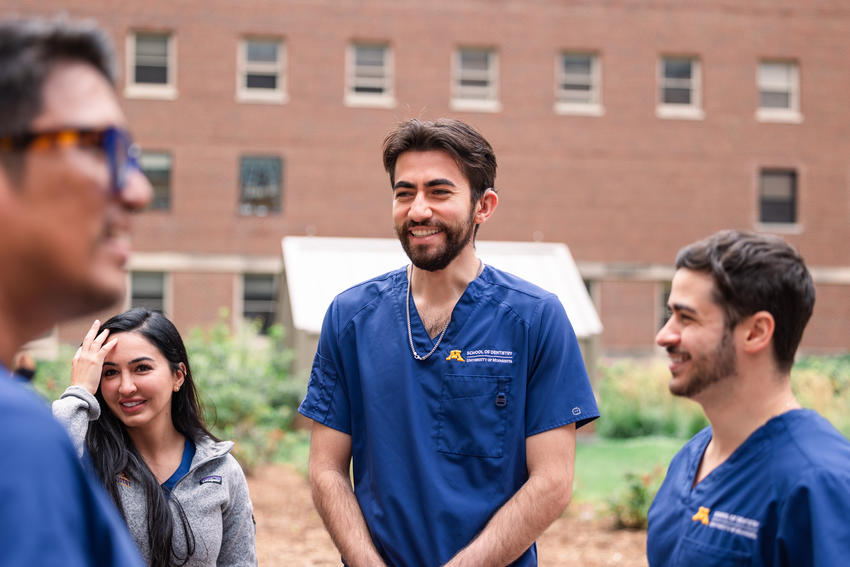
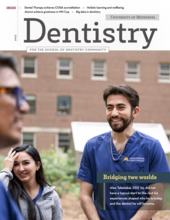
Alex Tabatabai, DDS ’25, did not have a typical start to life—but his early experiences shaped who he is today, and the dentist he will become.
Born across cultures
Tabatabai was born completely deaf in a time when hearing tests were not common at birth. As a result, his family did not find out he was deaf until he was two and a half years old.
“For my first two years of life, I couldn’t hear at all,” he recalled. Tabatabai would not speak his first words until age four.
The late diagnosis caused delays in Tabatabai’s speech development, but he received cochlear implants and “through hard work and development, managed to be where I am today.”
Growing up deaf in a hearing family sometimes made Tabatabai feel like he was torn between two worlds.
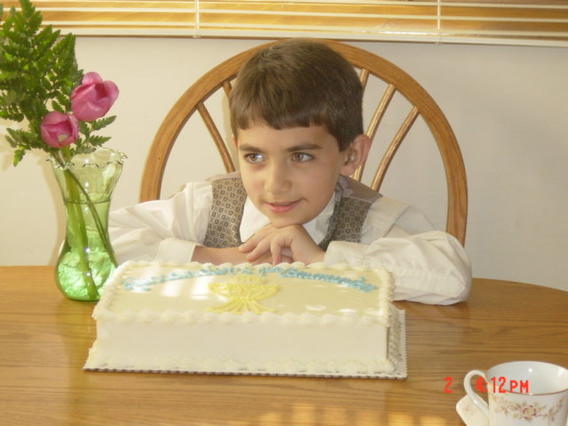
“As I grew up, I didn’t learn any sign language,” he explained. The use of his implants and hearing aids rooted Tabatabai in the speaking world, while also dividing him from some members of the deaf community who prefer to exclusively sign and avoid implants and hearing aids.
“I find myself in the middle of two worlds,” he said. “Deafness is a spectrum, and I’m right in the middle.” Today, Tabatabai is fluent in sign language—but given a preference, he will choose to speak and use his implants, because it’s how he grew up.
College was the first time Tabatabai connected with other deaf and hard of hearing individuals. “I interacted with my community for the first time,” he recalled. “It was an amazing experience, and it’s how I solidified my own identity.”
Tabatabai’s identity is also informed by his own family. A second-generation Iranian-American, Tabatabai’s culture is influenced by his father, who immigrated to the United States at the age of 21. “He brought his culture to the family, and because of that, I started to view the world from a different lens and appreciate other cultures more,” he said.
Among the many lessons learned from Tabatabai’s roots was an understanding of how different communities view and understand disease. “For example, a long-standing Iranian tradition adamantly declares that eating pigeon eggs will cure deafness,” he said. “In my case, it didn’t work, but that didn’t change the mind of anyone from my community.”
That experience taught Tabatabai the value of cultural traditions within a community, while also giving him insight into how access and understanding of medical care can impact treatment. “My family and cultural traditions led me to appreciate diversity, and gave me the tools to effectively counsel, educate and treat patients from different backgrounds and ethnicities.”
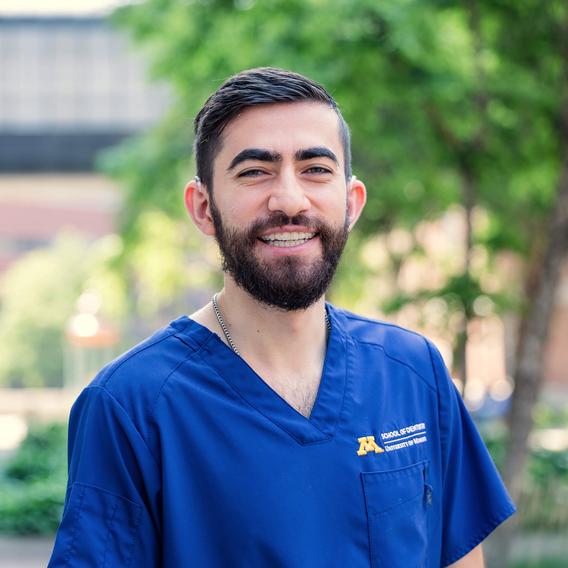
A career built on passion
As a child, Tabatabai was drawn to all things technological. He understood computers before he could speak. “I was amazed at how technology had an impact on changing the way we live,” he said.
That passion deepened when he received his cochlear implant, expanding his ability to process frequencies.
“It helped increase my language and sound experience,” he recalled. “I was introduced to a new realm of sound.”
He began producing music in college, focused on music theory and production. “As I listened to albums and singles, I commented on every instrument used and how the sound blended together,” he said. “It drove my friends crazy, but I couldn’t help myself. Music is now a big part of my life.”
That same fascination with harmony, frequency and technology inspired the path that would eventually bring Tabatabai to dentistry. He first explored a career in computer engineering, but found that a connection with people was lacking. As he looked toward other career options, dentistry stood out as an excellent option that combined technology and patient care. Then, the opportunity to shadow a deaf dentist sealed the deal.
“My experience with the deaf dentist was amazing. Every time we had a patient come in with pain, they would be limited on how they could speak. Because I rely on lip reading, facial expressions and body language, I would have trouble understanding them. Once the dentist completed treatment, the patient would be able to facially express, and I could understand them much better. That was personal to me, and that’s when I knew dentistry was the right path for me.”
Supported at every level
Set on a career path, Tabatabai began the search for the perfect dental school for him—and the University of Minnesota stood out from the beginning. Not only was it close to home, but the university promised excellent accommodations.
“The University of Minnesota provides some of the greatest accessibility services I could ask for,” he explained. And the accommodations do not stop with institutional resources. Tabatabai has found incredible support and community in the people around him.
“The faculty are amazing,” he said. “They make sure I do well, take their time, and sit down with me to ensure I understand what I need to do.” In the clinic, Tabatabai has enjoyed the constructive criticism and validation he has received.
But most of all, Tabatabai knows he made the right choice with the University of Minnesota because of his dental class. “Some of my best memories come from time spent with my classmates,” he said. “Everyone is there for each other.” Tabatabai has felt support from classmates who help him when he needs—and he is helping them to become more well-rounded, prepared practitioners by teaching them sign language. “I know for a fact that many of my friends can use basic sign language very well, if they ever encounter a patient who needs it.
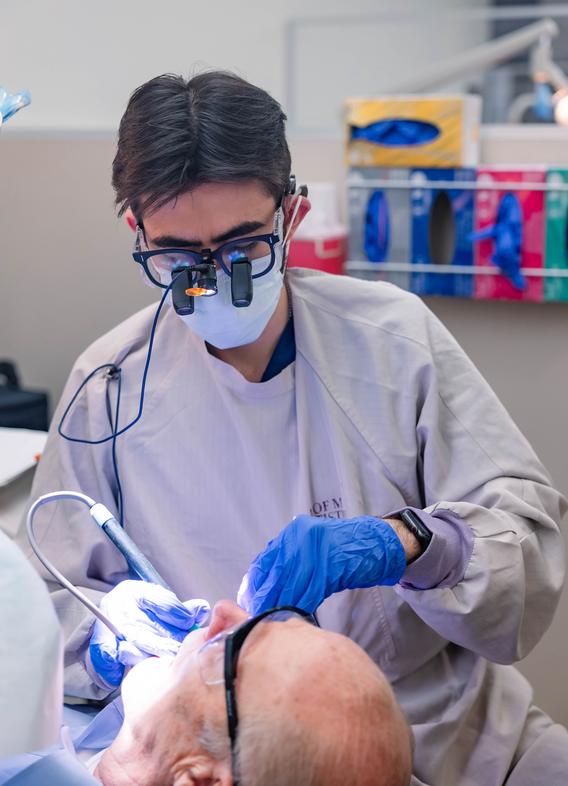
An impact across worlds
Spending time in the pre-doctoral clinics has been nothing short of excellent for Tabatabai. He loves the work, the technology and the experience of putting his learning into practice—but most of all, he loves the people.
“I can connect with and build trust with my patients and the people in my class,” he said. “It just clicks.”
Though the work is challenging, Tabatabai excels in the fast-paced, people-focused environment—and he is already looking forward to what is next.
Alex has a positive and energetic demeanor. He is always ready to help, and acts as a leader for his peers. He is a team player, is open to feedback, tries to make the most out of his clinical sessions and goes above and beyond to help everyone.
Alex is a great person with a big heart. Nothing prevents him from learning, and helping, and going forward in life. He will go far in life not only because he is smart, but also because of his attitude. It is a pleasure to teach and interact with him.
Elham Akhlaghi, DDS
Clinical Professor, Division of Periodontology
When Tabatabai graduates in 2025, he hopes to specialize in periodontology or endodontics. His experiences so far with deep cleanings and the promotion of gum and bone health have inspired Tabatabai and left him feeling like periodontology will allow him to make a great difference.
“Periodontology is concerned with the foundation of maintaining our teeth: gums and bone,” he explained. ”People who have compromised periodontal health will eventually lose their teeth. When we lose our teeth, we tend to be more self-conscious, and it can affect the way we speak and facially express, which becomes a communication barrier. Not only do I want people to be confident with their smiles, I also feel compelled to help others improve their communication. As a deaf individual who lived with communication barriers throughout my lifetime, it’s a way in which I want to make a difference.”
Meanwhile, endodontics inspires Tabatabai because “it’s a specialty that requires a lot of patience, technical skills and working with patients who are nervous or in pain,” he explained.
“Patients who are in pain cannot fully express their body language. Having the ability to help patients get out of pain and better communicate with others around them is one of the core reasons I want to be a dentist,” he said. “Specializing in a field that focuses on getting people out of pain is what I’m passionate about—whether that ends up being endodontics or periodontics.”
Alex has an incredibly positive spirit, and an attitude where he wants to learn as much as possible. He is a team player and is always willing to help in the clinic. His patients have nothing but the best to say about him. He puts the needs of his patients above all else. He brings such a positive energetic happy spirit to the clinic that he is just delightful to work with. Alex has an incredible passion to learn and welcomes constructive criticism so he can improve on his patient care skills. He is a kind and caring student dentist and he is cooperative and has a positive attitude when dealing with his patients, faculty, staff, and peers.
Richard Nadeau, DDS, MPH
Clinical Professor and Director, Division of Comprehensive Care
Most importantly, Tabatabai wants to become an advocate for the deaf community—as a practitioner and as an example.
In practice, he hopes to teach his classmates and colleagues how they can be the best providers possible for deaf and hard of hearing individuals.
“I want to make sure dentists are aware of how to treat deaf and hard-of-hearing individuals,” he explained. “We rely on body language, facial expression, lip reading and everything visual. If a provider comes in, wearing a mask, and isn’t facially expressing or using their hands, the individual may feel uncomfortable—so I want to help dentists understand how to interact, how to increase patient comfort.”
The first day I met him in clinic, Alex immediately explained about his hearing loss and how his cochlear implants work. I was so impressed with this openness and how it made me feel comfortable asking questions to understand better. He does the same thing with his patients and in doing so, they are not only put at ease, but they learn about new technologies as well. If it is tiring for Alex to continually explain his amazing story to others, it does not show. He has shared with me that his goal is not only to become a great dentist, but to increase awareness of disability and diversity.
Wendy Engstrom, DDS
Clinical Assistant Professor, Division of Comprehensive Care
And in his everyday life as a dentist, Tabatabai hopes to speak up and bring awareness to the needs of the deaf community—from access to care to the need to treat individuals as individuals. “I want to raise awareness of who we are, how far we have come and what our struggles are,” he explained. “Everyone is unique, and deafness is a spectrum. There are so many fantastic deaf individuals out there, doing amazing things. I just want to be a part of that, and be an advocate.”
No matter the direction Tabatabai’s life takes in the future, one thing is clear: he is already achieving his goal of becoming an advocate, an example and a provider who takes pride in connecting with his patients.
This story originally appeared in the 2023 edition of Dentistry Magazine.